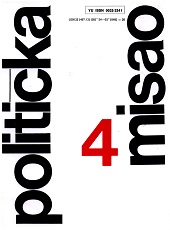Subjektiviranje i kraj moderne države?
The Subjectivization and End of the Modern State
Author(s): Žarko PuhovskiSubject(s): Politics, Political Sciences, Civil Society
Published by: Fakultet političkih znanosti u Zagrebu
Keywords: Subjectivization; End; Modern State;
Summary/Abstract: The state of the modern age (i.e. the state as such, as opposed to the classical concept of the community) is determined by its relationship towards the civil society, by the relationship between politics and production. Politics has abstracted itself from this relationship. and rules from this abstracted position over the civil society as an external force. In the 20th century a change occurs— the state becomes a subject: it is no longer a mere machinery but the founder and author of the essential content of the epoch. Society is no longer a societas societans but only a societas societatu, but the state, too. cannot continue as a simple quantitative enlargement of its original definition. The state-society relationship is no longer possible, since their existence as two distinct parts this relation presupposes is replaced by a pseudo-community. At a theoretical level, this is shown by the modern concepts of justice (Hayek, H P. Pitkin. Rawls), which, according to the classical concept, always refer both to the political and the economic sphere. The consequence of such views is the belief in the need for a methodologically and conceptually new approach to this essential relationship of the epoch.
Journal: Politička Misao
- Issue Year: XIX/1982
- Issue No: 04
- Page Range: 420-427
- Page Count: 8
- Language: Croatian

